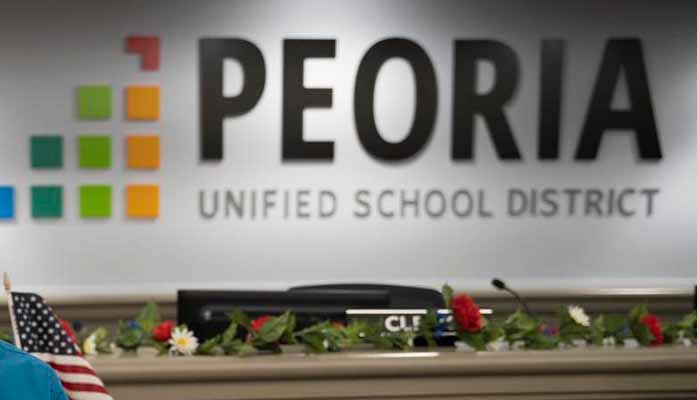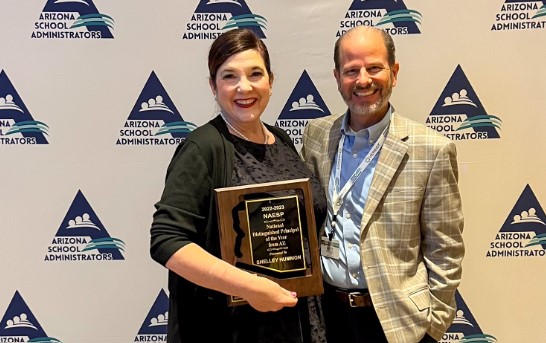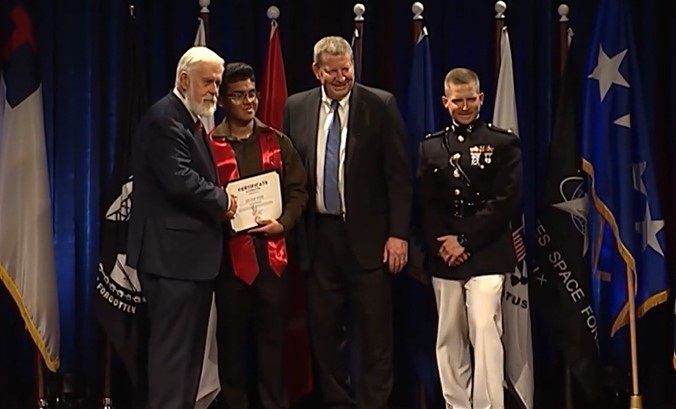
by Daniel Stefanski | Jul 17, 2023 | Education, News
By Daniel Stefanski |
The State’s Republican Superintendent of Public Instruction continues to fight on behalf of an Arizona law.
Last week, the Arizona Department of Education sent a media advisory to note that “State schools chief Tom Horne is at U.S. District Court in Tucson to stand up for the state’s law prohibiting biological boys from participating in girls’ sports.” The communication announced that “a federal judge is hearing arguments whether to temporarily block the ban that was signed into law last year.”
That law was SB 1165, which was signed by former Arizona Governor Doug Ducey on March 30, 2022. The law prohibits biological males from competing in women’s and girls’ athletic events at state public schools, colleges, and universities.
The Department later posted a tweet on the issue, which stated, “Superintendent Horne is defending Arizona state law which bans biological boys from competing in girl’s sports. Title IX was created for equal opportunities for female athletes, and allowing males to compete in women’s sports undermines everything these athletes have fought for.”
AZ Free News reached out to Superintendent Horne about his thoughts on the legal hearing and the case in general. Horne replied, “It’s partly about safety but it’s mostly about fairness and the fact that there have been many news articles about girls who focused very strongly on sports, worked really hard, hoped to excel, maybe get a college scholarship or be in the Olympics or whatever, and then all of a sudden have to compete against biological males. They have no chance to compete successfully against them and they’re devastated by it. Now they have found what they believe to be sympathetic plaintiffs because they’re 11-year-olds who are using puberty blockers, so they say they lose the advantage of males. But we have presented numerous peer-reviewed scientific studies to the court showing that even before puberty, males still have an advantage. Our evidence is overwhelming compared to theirs.”
The Arizona Women of Action applauded the latest action from the Department, writing, “We greatly appreciate Tom Horne for upholding the Save Girl’s Sports Act. AZ Women of Action stands with Tom Horne in this endeavor by joining the lawsuit & representing Arizona families who want to save girls’ sports.”
At least some Democrats saw Horne’s defense of the law in a different light. The Yavapai County Democrats tweeted, “Sup. Horne seen here wasting time on a manufactured crisis. Protect public schools. Do something useful for education. Horne is a disgrace.”
Horne isn’t the only Arizona official who has weighed in on this court case. Earlier this year, both Arizona Senate President Warren Petersen and House Speaker Ben Toma filed a Motion to Intervene in the United States District Court for the District of Arizona Tucson Division. The Senate Republican’s press release highlighted that “on April 17, 2023, plaintiffs represented by a radical organization filed a motion for a preliminary injunction to stop the law from being enforced in Arizona,” and “Attorney General Kris Mayes is not defending the constitutionality of the law.”
At the time, Petersen said, “In the absence of the Attorney General defending Arizona’s law, we’re looking forward to fighting for the rights of female athletes across Arizona, as well as for the Court making it clear Arizona’s law protecting women and girls should be enforced.”
Daniel Stefanski is a reporter for AZ Free News. You can send him news tips using this link.

by Corinne Murdock | Jul 16, 2023 | Education, News
By Corinne Murdock |
Peoria Unified School District (PUSD) is allowing males into girls’ bathrooms and locker rooms, overlooking evidence of females harmed by policies allowing gender identity to dictate bathroom usage. Legal counsel for the members advised a need to align with the Biden administration’s interpretation of Title IX, based on recent legal rulings in the Ninth Circuit.
Board members Melissa Ewing, David Sandoval, and Bill Sorensen supported allowing students to use the bathrooms or locker rooms based on their gender identity. Board members Heather Rooks and Rebecca Hill opposed it.
The Biden administration announced in 2021 that it intended to expand Title IX sex-based protections to include sexual orientation and gender identity. The Education Department proposed the change to the policy last year; in May, the Biden administration announced that it would publish the final Title IX rule in October.
The rule change received over 390,000 public comments.
The Biden administration’s updated version of Title IX would not only allow gender identity to determine locker room and bathroom access — it would also impact sports team admissions.
In an April meeting, PUSD member Ewing claimed that no problem existed against preventing boys from entering girls’ spaces because no similar crimes have been reported in PUSD schools. Ewing further claimed that national data doesn’t support the belief that female-identifying males present a danger in private female spaces.
“If you look at our incident reports, and the narrative about assaults in the bathroom, it has not come as the result of a transgender-identified student. There is not a single incident that has happened,” said Ewing. “And if you look at the nationwide data, that does not show it as well. As board members, we need to be making sure that we are making data-driven decisions.”
Last month, Ewing shared a legal opinion from an LGBTQ+ advocacy site which argued that the Ninth Circuit’s ruling that discrimination based on sexual orientation violates Title IX protections.
Although Ewing claimed no bathroom assault cases exist due to transgender individuals, there were several high-profile cases over the last few years. Their existence was brought up in a viral video pulled from a recent meeting.
Ben Larrabee, project manager for conservative activist organization Turning Point USA, cited multiple cases in which males identifying as females were alleged to have flashed, sexually assaulted, or raped girls or women after entering female bathrooms or locker rooms.
This included the two teenaged girls sexually assaulted by the same gender-fluid teenage boy at two different schools in Loudoun County, Virginia; the sexual assault of a five-year-old girl by a gender-fluid boy in Decatur, Georgia; and the assault of a teenage girl by a teenage boy identifying as a female.
“Before you say that these are anecdotal evidence, just note that in a survey of trans inmates in federal prisons, half were convicted of sexual assault and 90 percent were convicted of violent crimes: well above the general prison population,” said Larrabee.
Larrabee noted that the perpetrators in the study he cited had all received some form of transgender care or gender identity accommodations.
“You do not affirm that people with anorexia can be healthy in any way, you do not affirm that somebody with schizophrenia is hearing voices, and you do not affirm that somebody in a manic episode is having great ideas,” said Larrabee. “When you leave someone to languish in their false mental state — i.e. men who think they’re women — they will inevitably lash out and harm themselves and those around them. Hurt people hurt other people.”
Board members Rooks and Hill attempted to enact a policy preventing males from entering female bathrooms and locker rooms in April. Ewing, Sandoval, and Sorensen blocked that policy.
Corinne Murdock is a reporter for AZ Free News. Follow her latest on Twitter, or email tips to corinne@azfreenews.com.

by Daniel Stefanski | Jul 14, 2023 | Education, News
By Daniel Stefanski |
Americans’ support for school choice is on the rise.
A recent poll from Real Clear Opinion Research showed that school choice has the support of 71% of the 1,000 registered voters who participated in that survey. This number was a seven-point increase from an April 2020 poll.
In this June 27-30 poll, support for school choice came from 80% of Republican voters, 66% of Democrat voters, and 69% of Independent voters. Though the Republican and Democrat support was up from April 2020, the 9% increase in favor from Independents was the most among the political parties.
The question presented to voters on the survey was as follows: “School choices gives parents the right to use the tax dollars designated for their child’s education to send their child to the public or private school which best serves their needs. Generally speaking, would you say you support or oppose the concept of school choice?”
The CEO of American Federation for Children, Tommy Schultz, lauded the news about the growing support for school choice around the country, saying, “School choice support is here to stay, and politicians who ignore this reality do so at their own peril. Parents are the new interest group in town, and legislators would be wise to keep responding to their needs. The days of the old one-size-fits-all model are numbered, welcome news for the countless students who need something different to learn and thrive. AFC is thrilled to continue standing behind parents as they gain more options for their children’s education.”
Arizona has been at the front lines of the surge in school choice support. Last year, the Republican-led Legislature passed a historic expansion of the state’s Empowerment Scholarship Account (ESA) Program, allowing any child in K-12 to apply. According to a June 30 update from the Executive Director of the ESA Program, Christine Accurso, 62,005 Arizona students have now been enrolled.
That same update also showed that the program, under the direction of Republican Superintendent of Public Instruction Tom Horne, had largely caught up with the backlog and influx of reimbursements to ESA account holders. As of June 30, the ESA Program only had 1,195 Reimbursement Orders in the queue – down from 24,409 on February 8.
When asked about the increasing support for school choice in Arizona and around the nation, Superintendent Horne told AZ Free News, “We have a lot of excellent public schools in Arizona. But no matter how good a public school is, it may not be able to meet the needs of all students. Rich parents have always had the ability to choose the best school to meet the needs of each of their children and people at all economic levels should have the same ability. In addition, competition improves public schools. The United States has been prosperous, and the Soviet Union was poor, because we had competition which drives people to do their best, while they were a government monopoly. As they used to say in Poland, ‘We pretend to work, and they pretend to pay us.’ The same applies in education. Competition causes everyone to do better.”
Daniel Stefanski is a reporter for AZ Free News. You can send him news tips using this link.

by Corinne Murdock | Jul 8, 2023 | Education, News
By Corinne Murdock |
A Scottsdale Unified School District (SUSD) principal serving on the board of a prominent LGBTQ+ activist group has won principal of the year.
Pueblo Elementary School Principal Shelley Hummon won the 2023 National Distinguished Principal (NDP) from the National Association of Elementary School Principals (NAESP). The Arizona School Administrators’ (ASA) Elementary Division selected her to win. Hummon also serves on the board of one-n-ten, a Phoenix-based LGBTQ+ activist group targeting minors and young adults.
As part of the award, Hummon will be flown to Washington, D.C. in October for formal recognition at an NAESP event.
Like one-n-ten, NAESP supports promoting LGBTQ+ ideologies among children. NAESP expanded its focus on diversity, equity, and inclusion in recent years to include gender identity and sexual orientation.
In June 2021, NAESP featured another elementary school principal, Seth Daub of Orange County Public Schools, to argue that educators should guide children in LGBTQ+ beliefs.
“When addressing the topic of LGBTQ inclusion at the elementary school level, schools need to exhibit much more than mere tolerance,” wrote Daub. “Educators must make the conscious choice to accept, embrace, and celebrate it, and must do so without question and without hesitation.”
NAESP, like one-n-ten, also opposes the exclusion of males identifying as females from female sports and private spaces.
Another significant one-n-ten board member is Tracy Nadzieja, the first transgender judicial officer in Arizona. Nadzieja, a man who identifies as a woman, has served on the Maricopa County Superior Court bench since 2018. Nadzieja also volunteers with the women’s collegiate fraternity, Kappa Kappa Gamma (KKG). (KKG is considered a “women’s fraternity” because it was founded before the creation of the term “sorority.”)
Other one-n-ten board members are:
- Rick McCartney (chair), CEO of InMedia Company and board member for the Children’s Museum of Phoenix and Gov. Katie Hobbs’ Workforce Council;
- Kris Cano (vice chair), WestWorld general manager and former Scottsdale Police Department forensics director;
- Scott Greenwood (treasurer), longtime ACLU general counsel, board member, and executive committee member;
- David Cane (secretary), Wag! executive and former Uber program lead;
- Cory Braddock, partner at Snell & Wilmer law firm;
- Bev Crair, senior vice president for Oracle Corporation;
- Calvin Cole, vice president of AmTrust Bank and board member for Terros Health, Keogh Health Foundation, and Boys and Girls Club of the East Valley;
- Angie Dittrich, American Express senior manager and lead for the company’s PRIDE+ Colleague Network;
- Darryl Embrey, Vanguard senior business technology project manager;
- Valdo Figueroa, Wells Fargo senior technology operations manager and formerly Bank of America senior vice president;
- Lou Goodman, retired Arizona Department of Juvenile Corrections executive and pro tem Maricopa County justice of the peace;
- Floyd Hardin III, Rio Salado College’s executive officer of equity and college relations;
- Manuel (Manny) Soto-Griego, health information management professional and Arizona Health Information Management Association board member;
- Sima Thakkar, Raza Development Fund senior director of health & climate equity, with former roles as regional relationship manager for PetSmart Charities, and manager of the city of San Diego’s Community Development Programs on affordable housing and homelessness;
- Judie Verb, U.S. Bank executive vice president, Arizona Council on Economic Education board member, and Government Relations Council member for Consumer Bankers Association;
- Nate Rhoton (one-n-ten CEO), chair of the city of Phoenix’s Human Relations Commission, vice chair of Leading for Change, member of Maricopa County Community Colleges’ LGBTQ Advisory to the Chancellor, with former roles as a Human Rights Campaign steering committee member, Greater Phoenix Gay & Lesbian Chamber of Commerce board member, and Equality Arizona board of directors co-chair.
Sponsors of one-n-ten include American Airlines, Cox, SRP, Tito’s Vodka, and Estrella Jalisco.
Corinne Murdock is a reporter for AZ Free News. Follow her latest on Twitter, or email tips to corinne@azfreenews.com.

by Daniel Stefanski | Jul 3, 2023 | Education, News
By Daniel Stefanski |
Arizona’s Superintendent of Public Instruction shared a helpful announcement about a new feature for high school students seeking information about careers in the U.S. military.
In a release sent last week, the Arizona Department of Education revealed that it had “unveiled a one-stop service to help students interested in a military career get information about the U.S. armed forces.” The website – azed.gov/military – was established so that “students can get essential information about the various branches of the service.”
Horne, a Republican, issued a statement in conjunction with the announcement, saying, “With a historic shortfall of U.S. military recruiting goals, Arizona high schools need to do as much as possible to help students get the information they need to learn if a career in the armed services is an appropriate choice for them. Serving our country is an honorable endeavor and our nation will depend on the next generation of those who enlist or become officer candidates so that our military can continue to defend our freedoms.”
The release highlighted that “the need for this effort was presented to state schools chief Tom Horne earlier this year by Raif Byers, a now-graduated Phoenix-area high school senior who was unable to find helpful and detailed information about a military career on the websites for his high school or the district he attends. He found that many other students his age have the same problem.”
Byers added, “I was trying to learn more about a career in the Navy when I was in high school, but it was nearly impossible for me to find any information on my school district website. It’s relatively easy to learn about other types of careers, so I believe it’s just as vital for schools to make armed services information readily available to students. Unfortunately, I learned that in many districts, that’s just not the case. I’m very grateful to Superintendent Horne for creating this webpage where anyone in the state can easily learn about a career serving our country.”
According to the Arizona Department of Education, “the webpage includes links to the Army, Navy, Marine Corps, Air Force, Space Force, Coast Guard, Army National Guard and Air National Guard. It also has details about the various military benefits and information for those interested in becoming officers or enlisted personnel.”
Horne’s efforts join several other similar endeavors from public officials around the state, who are very active in promoting opportunities in the U.S. Military or honoring those who serve. Recently, Glendale Mayor Jerry Weiers “partnered with local sponsors to host the Mayor’s Military Induction Ceremony” at a Phoenix-area church – with over 350 recruits!
In May, two in Arizona’s congressional delegation, Andy Biggs and Eli Crane, co-hosted a Military Service Academy Conference to give high school students more information about opportunities to learn more information about future military service and career opportunities.
Daniel Stefanski is a reporter for AZ Free News. You can send him news tips using this link.

by Daniel Stefanski | Jul 3, 2023 | Education, News
By Daniel Stefanski |
Arizona elected officials found no shortage of material to react to from the U.S. Supreme Court’s latest term.
On Friday, the nation’s highest court released its opinion in Biden v. Nebraska, striking down the president’s student loan cancellation program. Chief Justice John Roberts authored the opinion, and he was joined by Justices Clarence Thomas, Samuel Alito, Neil Gorsuch, Brett Kavanaugh, and Amy Coney Barrett.
The majority opinion stated that “the ‘economic and political significance’ of the Secretary’s action is staggering by any measure. Practically every student borrower benefits, regardless of circumstances. A budget model issued by the Wharton School of the University of Pennsylvania estimates that the program will cost taxpayers ‘between $469 billion and $569 billion,’ depending on the total number of borrowers ultimately covered.”
State legislators were quick to respond to the momentous decision from the Supreme Court. Freshman Republican Representative Austin Smith tweeted, “Canceling student loan debt is and always will be an irresponsible and brainless ‘policy’ proposal. It deserved this fiery death at SCOTUS. Do not take out astronomically large loans for a career with a salary you will never be able to pay off.”
Smith also parried an attack from the House Democrats Caucus, which took to Twitter to pin the decision on Republicans. This tactic didn’t sit too well with Smith, who said, “The Constitution did this. Cope and seethe.”
On the other side of the aisle, Senate Democratic Assistant Leader Juan Mendez released a statement shortly after news broke about the opinion, writing, “Today’s decision on Student Loan Relief is all the evidence we need to rule this court as corrupt. For generations this court as been playing favorites, taking sides and receiving undisclosed donations, all while Congress has been bailing out corrupt corporations, reckless Wall Street traders and forgiving PPP loans for the wealthy.”
Senator Mendez also called on President Biden to take further action, saying, “The Court’s biased decisions can not go unanswered. The President must do everything within his power to set student loan interest rates to 0%, set minimum monthly payments to $25, and revamp current repayment plans to accept volunteerism as payment.”
Earlier this year, Democrat Attorney General Kris Mayes announced that she had withdrawn the State from a lawsuit over the president’s actions on student loans, which was initiated by her predecessor, Mark Brnovich. Mayes told KTAR News that “we’re not going to be engaging in political lawsuits at the Attorney General’s Office anymore,” and that “suing the federal government over everything is not the answer and it’s not what the people of Arizona want.” The KTAR recap of the interview noted that the first-year attorney general “said the student debt lawsuit was inappropriate and unlikely to succeed.” Instead, Mayes joined a coalition of attorneys general from around the country to support a “federal proposal to create a more affordable repayment plan for student loan borrowers.”
Daniel Stefanski is a reporter for AZ Free News. You can send him news tips using this link.






